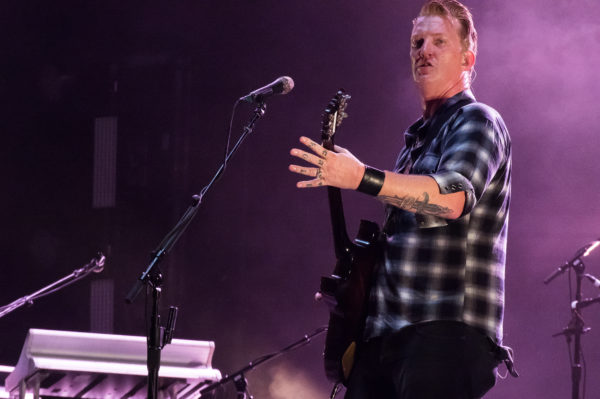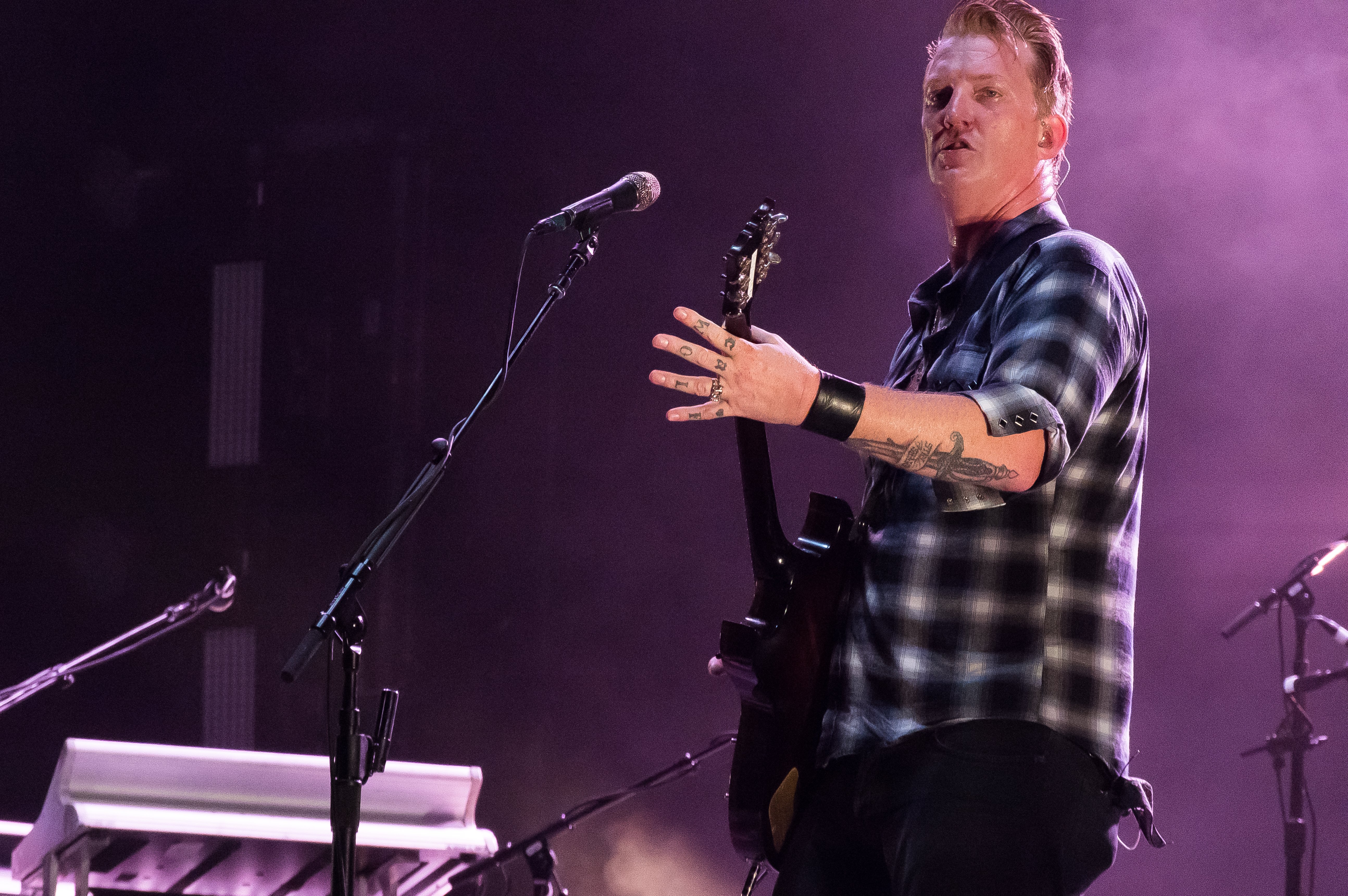
Most relevant hard rock groups are acts of survival rather than revival. Other than a few groups like UK’s Royal Blood, most currently relevant hard rock acts were born out of 90s scenes like grunge or the sludgy drone of the Palm Desert Scene. Queens of the Stone Age (QOTSA) are no exception to this trend — the group began in 1996 and have spectacularly maintained mainstream relevance through a 20-year career, 15 of those years after propelling themselves into rock’s spotlight after their 2002 opus “Songs for the Deaf.” Part of QOTSA’s continued success stems from their ability to constantly reinvent their sound without ever conforming their rock to pop fads à la Maroon 5.
Much of the group’s motive to constantly change stems from QOTSA’s artistic desire to explore new sounds outside of their genre yet within their perceived canon. Yet it’s impossible to ignore the added incentive to evolve their sound to stave off the slow fade of repetitive obscurity that so many other rock acts have fallen into (see: the increasingly tedious dad rock of the Foo Fighters’ past four albums).
After seeing the slow demise of rock in part due to a genre-wide stagnation, QOTSA symbolically released “Villains” in the year that saw hip hop finally overtake rock as music’s most popular genre. To maintain relevancy and continue their rock revolution, QOTSA entered the “Villains”-era knowing that they had to respectfully reject their maximalist and dreary “…Like Clockwork,” despite that album’s critical acclaim.
“Villains” trades maximalism for minimalism, or at least as much minimalism a five-piece can muster. At its core, “Villains” sees frontman Josh Homme, Troy Van Leeuwen and Dean Fertina etch the entirety of record in treble and flat guitar tones. Rather than tantalizing the listener with a diversity of guitar tones, QOTSA coerce their listeners to their abrasive sound through a greater focus on diversity of riffs and instrumental interaction, from the funk-laced “Feet Don’t Fail Me” to the guitar-bass battle of melodies mid-way through “The Evil Has Landed.” The post-punk and krautrock-inspired “Head Like a Haunted House” poses as a prime example of the merits of pitting the band against itself: Guitar, bass and vocal melodies violently fight for the listener’s attention.
Since QOTSA put so much effort in maintaining this relatively minimalistic aesthetic, “Villains” unfortunately fails when it indulges itself, as seen in the final track “Villains of Circumstance.” While the verse maintains the Halloween-in-September vibe seen in “Un-Reborn Again” and the start of “Feet Don’t Fail Me,” the band then launches into an uncharacteristically sentimental and grand chorus. While “Fortress” and “Hideaway” teased this level of tenderness, “Villains of Circumstance” comes off as too saccharine for “Villains”, belonging more on “…Like Clockwork,” if anywhere in their discography, despite acting as “Villains”’ pseudo-title track. Fortunately, a (literal) last-minute jam returns the record to form and closes “Villains” out without a significant loss of sonic identity.
“Villains” is the first QOTSA album to see Homme out of any production role in the liner notes; instead, Homme ceded most production duties to DJ and pop producer Mark Ronson, most notable for his work with Amy Winehouse and the omnipresent “Uptown Funk.” Though Ronson steered the record’s sound away from the fuller sound of previous Queens’ albums, Homme still retains notable influence in the production, as seen through the record’s similarities to Homme’s previous production role in Iggy Pop’s “Post Pop Depression.” The stomping bass tone of “Domesticated Animals” plays like a further realized version of Pop’s “American Valhalla.”
Coming off the massive success of his funky “Uptown Special” record, Ronson was employed to give the album a poppy and danceable edge, a counter to Homme’s tendencies towards desert dreariness and lyrical malaise. As the two intended, their battle ends in a draw by the record’s end. For what will surely be a live staple for the rest of the band’s career, “Feet Don’t Fail Me” is a fearless testament to the Ronson-Homme duality: Homme starts the listener in a cave of eerie black noise that nervously creaks open a side door to a hellish synth-driven Gregorian chant, growing in urgency. After the chants crescendo into an all-out shout, “Feet Don’t Fail Me” unexpectedly transitions into Queens at their funkiest as Ronson takes the wheel and steers the song in a direction that turns and bobs heads. Rather than compartmentalizing Homme and Ronson’s dueling styles, lead single “The Way You Used To Do” features QOTSA’s signature desert rock riff seamlessly meshed with a signature Ronson syncopated bass drum pattern reminiscent of Ronson’s minimalist drumbeat on “Valerie” with Amy Winehouse.
Overall, Ronson and Homme get along well on the record, smoothly trading the second fiddle across all nine tracks. While Homme’s songwriting is about as solid and inventive as listeners heard on “…Like Clockwork,” the record can fall short due to its relatively narrow soundscape, which could be generally assumed as Ronson’s choice (as seen in his previous rock production work with Black Lips’ “Arabia Mountain.” Without a doubt, this flat sound accents the minimalism of “Villains” and gives it a distinguishable identity. However, more times than not, it can leave listeners wondering what could become if the songs were opened up past their narrow alleyway, giving Homme’s expansive songwriting room to breathe.
In Homme’s classic style, “Villains” is rife with self-contained, thoughtful quips and comments on personal demons and relationships. For the record as a whole, Homme is able to balance head-banging vocal riffs (“Feet Don’t Fail Me”) with sentimental analogies (“Fortress”).
By the time the nine tracks have expired, QOTSA have made a compelling counterpoint to an ever-growing demand for politically conscious music that has only accelerated after the events of 2016. Despite Homme’s seething anger towards the current political climate and administration, he vowed to continue QOTSA’s relatively apolitical lyrical stance, dubbing “Villains” an “escape” from politics akin to an “arcade.” Steering away from politics isn’t too much of a stretch for a commercially successful hard rock band — hard rock as a genre usually bends in an apolitical direction.
Yet despite Homme’s promise of escapism, “Villains” sounds apocalyptic. To many listeners, this doomy aesthetic may be hard to disassociate from society-at-large. While one can easily chalk the record’s sound to QOTSA’s anxiety with America’s current social and political climate, the record’s sonic palette, like its lyrics, is very likely still centered around Homme’s own personal issues, an extension of themes in QOTSA’s previous record. At Homme’s insistence, “Villains” is “about now,” personally not politically. Be it a cop-out or a genuine artistic choice, you have no choice but to take Homme on his word and on his groove.
Essential Tracks: “Feet Don’t Fail Me,” “Domesticated Animals,” “Head Like a Haunted House,” “Un-Reborn Again” and “The Evil Has Landed”
Mediocre Tracks: “Hideaway”
Contact Dylan Grosz at dgrosz ‘at’ stanford.edu.
